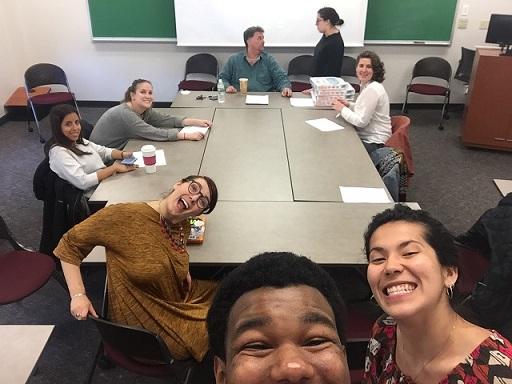
任务
Consistent with the missions of 火博体育大学 and the CSWE's Educational Policy and Accreditation Standards, the 社会工作部’s mission is to prepare students for entry-level 职业al 通才实践. It envisions that its graduates will become leaders through the provision of social work 服务 that promote human rights and social and economic 正义. It further holds the expectation that its graduates will contribute to the empowerment of 人/groups that experience oppression and discrimination.
学生学习目标
Below are the departmental learning goals mapped to College-wide goals for student learning.
With the liberal arts as its foundation, BSW graduates are prepared for entry-level social work practice and to continue their formal education in social work or another 研究生学科. As such, program goals for students include:
- Engage in evidence-based entry-level social work practice with individuals, families groups, communities and organizations within a multicultural society. (Ia, Ib, Ic, IIb, IIc, IId, IIIc, IIId, Iva, IVb)
- Practice according to the principles, values, and ethics that guide the social work 职业. (Ic, IIa, IIb, IIc, IId, IIe, IIIa, IIIb, IIIc, IIId, IVb, IVc, IVd)
- Influence social policies with the goal of alleviating poverty, oppression, and social in正义 as well as advocating for human rights. (Ia, Ib, Ic, IIa, IIc, IId, IIIc, iii, IVa, IVb)
- Identify and affect the bio-psycho-social, spiritual, and cultural functioning of 人. (Ia, Ib, IIa, IIb, IIc, IId, IIIb, IIId, Iva)
- Engage in practice from a culturally-sensitive perspective which recognizes and appreciates the intersectionality of diverse human identities. (a, b, IIc, IId, IIe, iib, IIIc, IVa, IVb, IVc, IVd)
- Provide leadership in practice settings appropriate to one’s practice role, skill 设置和教育水平. (Ic, IIa, IIc, IId, IIe, IIIc, IIId, IVb, IVd)
信息素养
- Define the information required for the assignment (e.g. 经验数据,主要或 secondary data, government agency report, etc.). (活动花絮,国际教育协会)
- Develop a plan for locating information (e.g.,关键术语,数据库,来源等.). (IIa, IIb, IIe)
- Critically analyze sources and available information (e.g.同行评议的变化, public agencies, research foundations, and advocacy groups). (Ic, IIa, IIb)
- Organize and properly cite sources (e.g.,使用Refworks, APA样式). (IIc, IIe, IVb)
- Summarize and document information retrieved (e.g.,有注释的参考书目). (Ia, Ic, IIb, IIc, IIe)
视觉读写能力
- Create, summarize, and interpret genograms and ecomaps. (Ic, IIa, IIb, IIc, IId, IIId)
- Create, summarize, and interpret timelines (e.g., historical, personal/familial, policy). (Ic, IIa, IIb, IIc)
- Create, summarize, and interpret tables and graphs (e.g.、研究、临床资料). (Ic, IIa, IIb, IIc, IVa)
- Create, summarize, and interpret visual representations of information (e.g.、概念 框架). (Ia, Ic, IIa, IIb, IIc, IIe, IVa)
科技素养
- Utilize a range of technology tools to locate and/or share information. (IIb, IIc, IId IIIc)
- Critically analyze the role of technology in the design and delivery of social work 服务. (IIa, IIe, iid)
- Incorporate technology in a manner consistent with 职业al ethical responsibilities 和标准. (iii a Ic)
有效的口头沟通
- Demonstrate 职业al ethics 和标准 in oral communication (e.g.,包括 confidentiality, 职业al demeanor and use of language). (i, IIc, IId, IIc, 印度河流域文明)
- Organize and present material as appropriate to the audience (e.g.、机构、政策制定者、 客户端). (Ib, IIa, IIc, IId, IIIc, IIId, IVb)
- Participate actively and appropriately in group discussions (e.g.积极倾听; 贡献). (IIa, IIc, IId, IIe, IIIc, IVb, IVc, IVd)
- Communicate effectively across potential barriers resulting from differences. (Ib, IIc, IId, iib, IVb, 印度河流域文明)
有效的书面沟通
- Develop a feasible research proposal that includes a well-integrated literature review, a thorough description of the selected research methodology, a discussion of the practice/policy implications of the proposed work, and an appropriate data collection instrument. (Ia, Ic, IIa, IIb, IIc, IIe, IIId, IVa)
- Conduct a policy 研究 that includes defining and describing a social problem and public narrative; summarizing and comparing perceptions of those who benefit from and/or work in a relevant field of practice; describing a related policy/program, its political context and history, and the logic or theory informing its design/implementation; critically analyzing the relevant social 正义 claim(s); and providing either a policy/program evaluation or advocacy brief highlighting key elements of the policy 研究. (Ia, Ib, Ic, IIa, IIb, IIc, IIe, IIId, IVa)